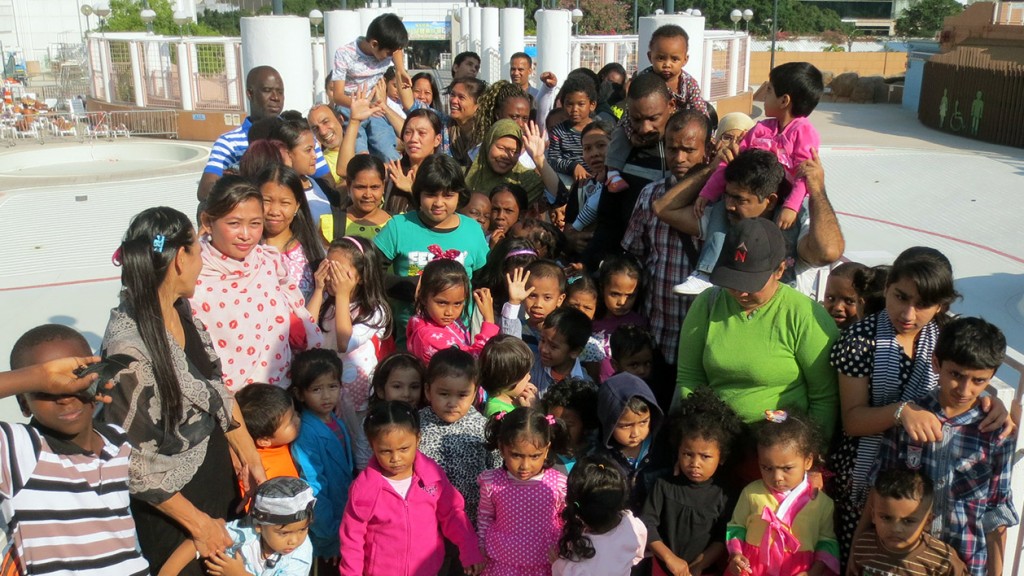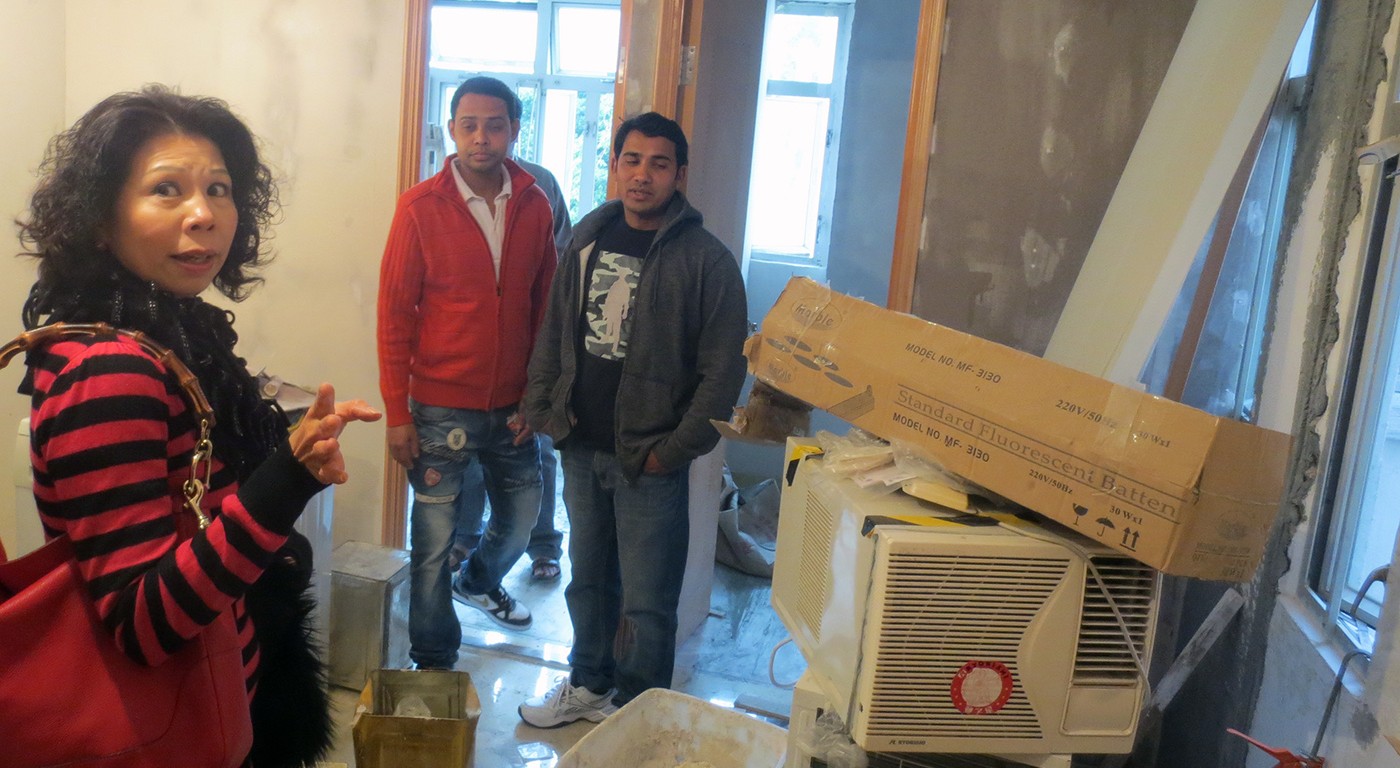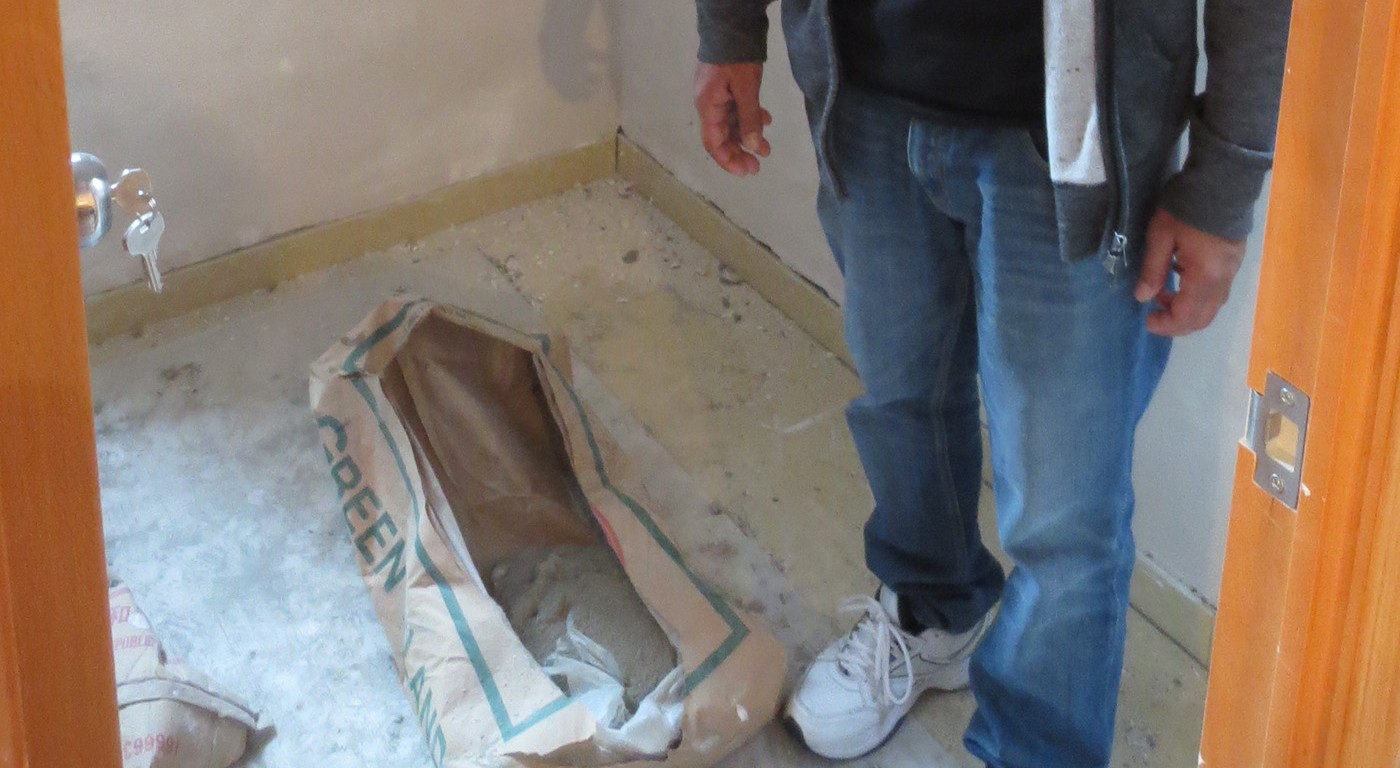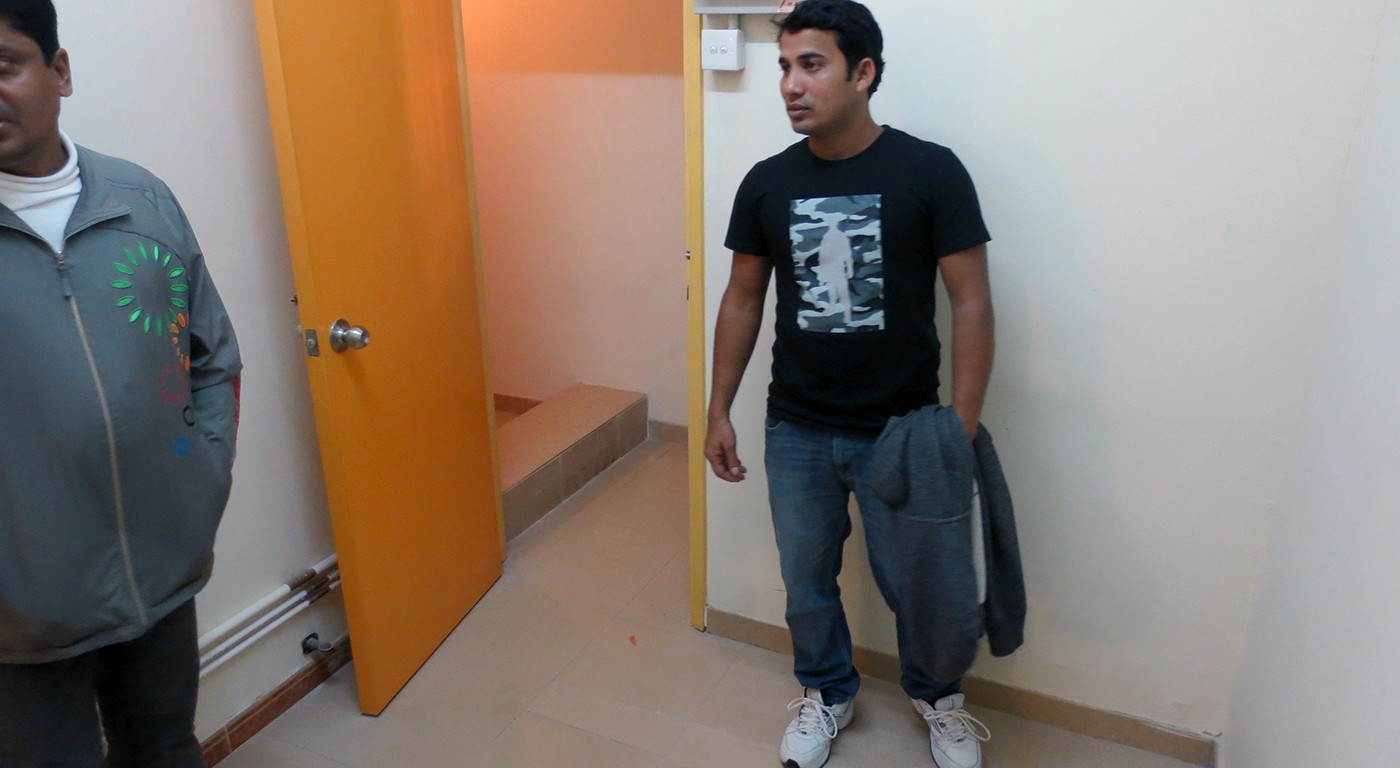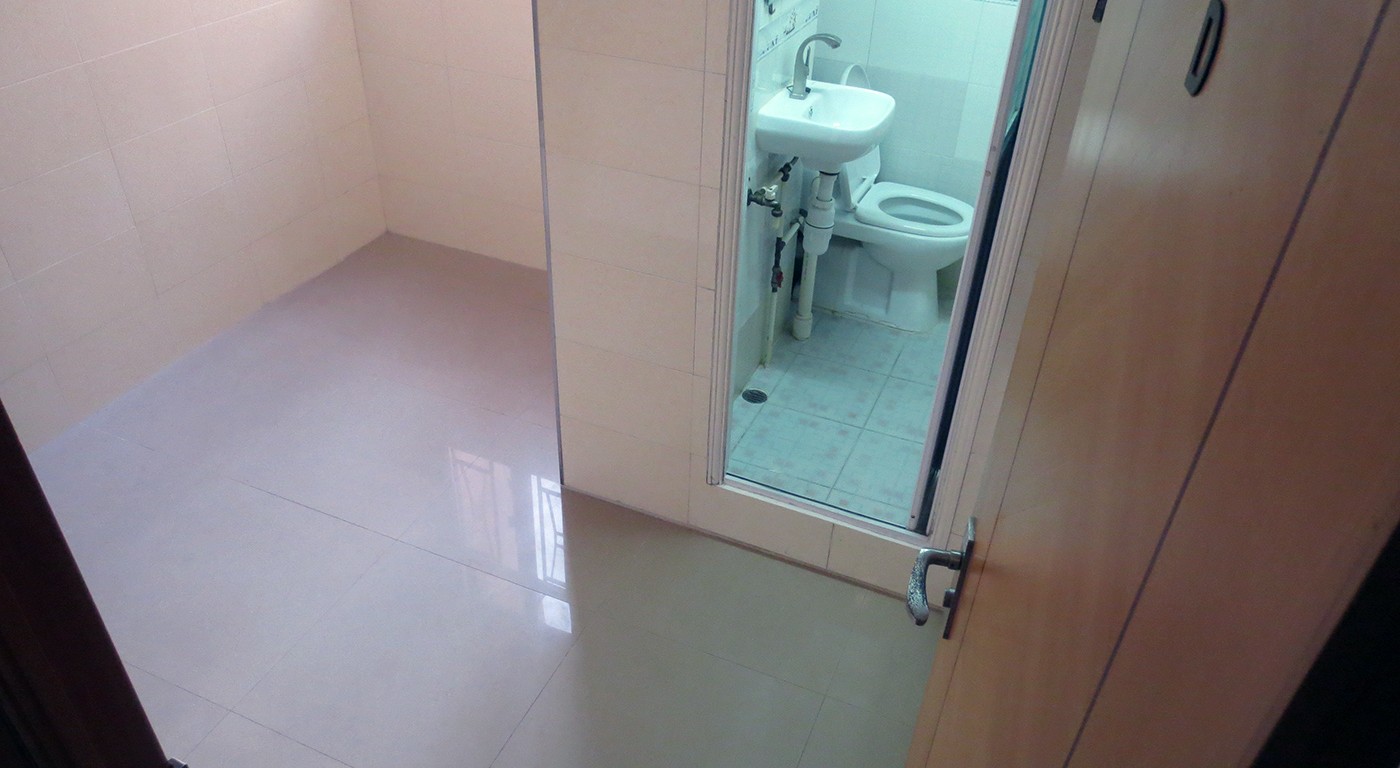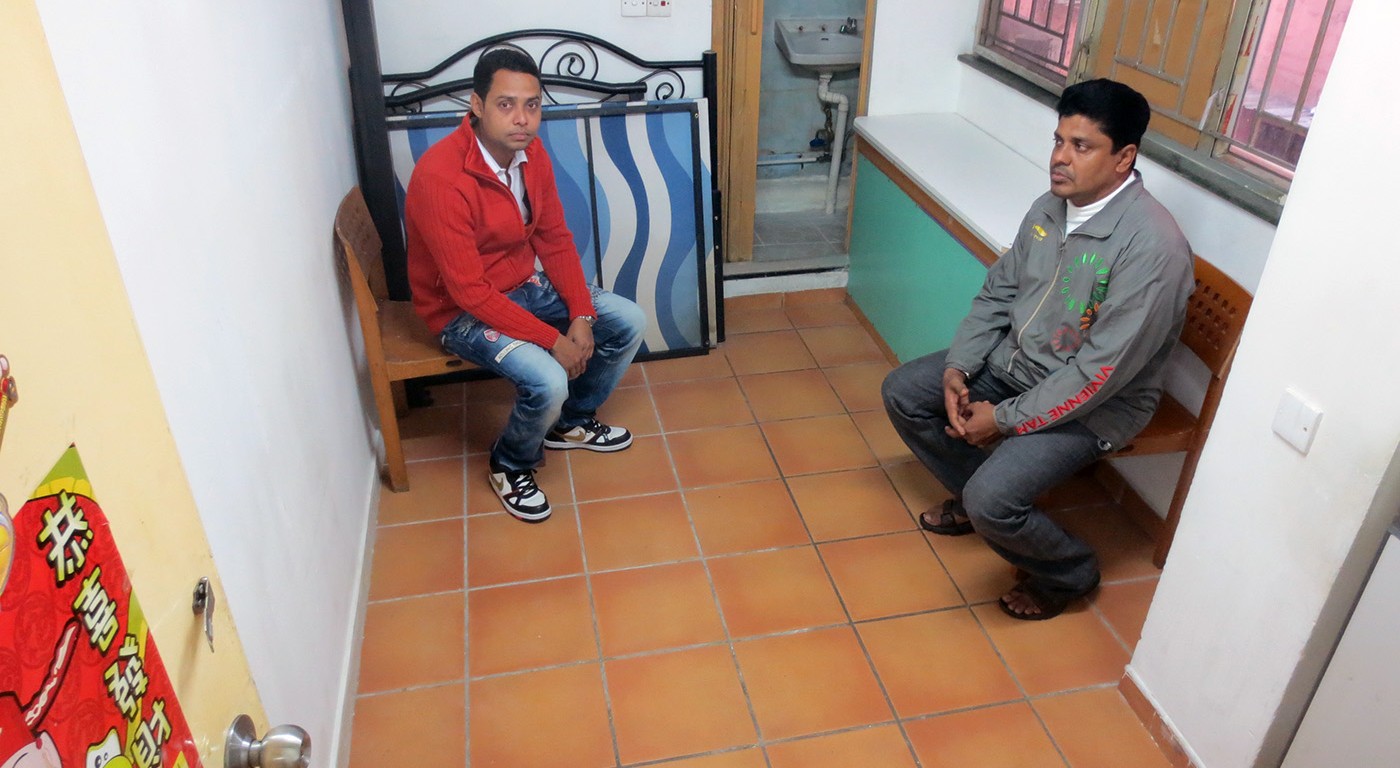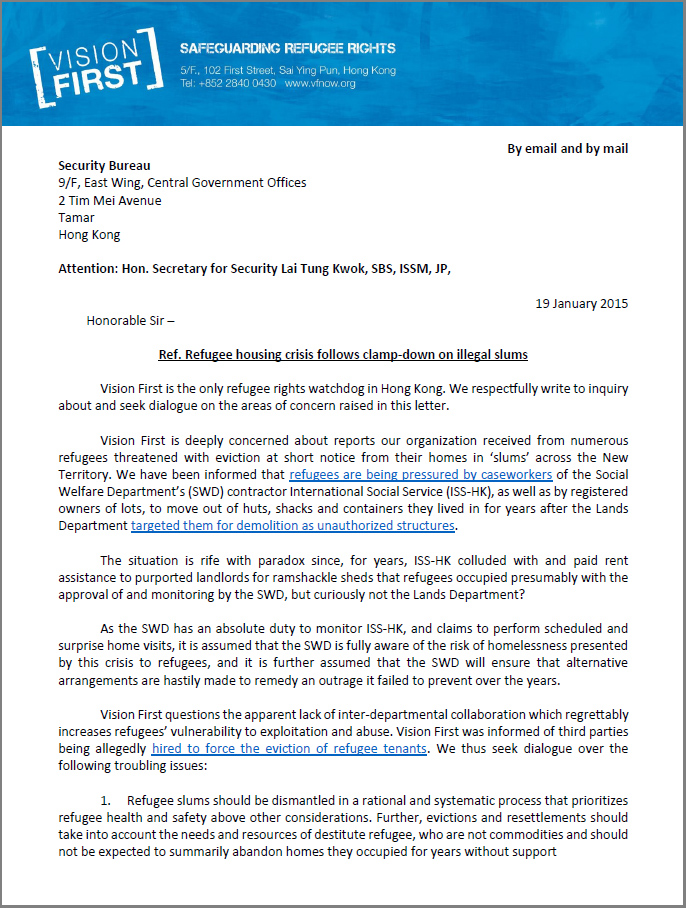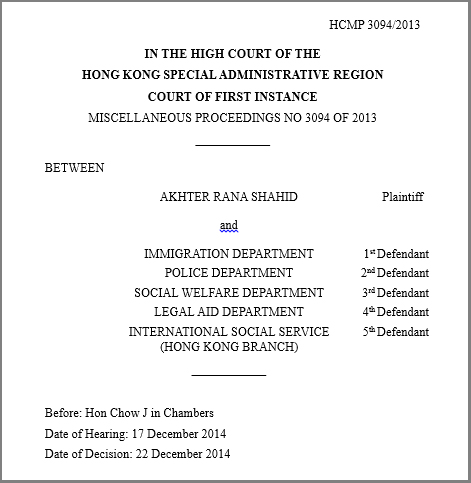Judicial Review favorable for dependent visas
Jan 28th, 2015 | Legal, VF Opinion | Comment
As many refugee spouses face “Non-Decisions” by Immigration on their dependent visa applications, a process that can drag on for years with the repeated submission of the same documents, those lucky ones who receive a reply may find it unsatisfactory.
Particularly, the following judgment seems to shine light on a depraved problem. What weight is given by Immigration to the applicant’s criminal record and family circumstances when considering a visa that may change not only the life of the sponsored refugee, but also that of resident children who might grow up without the love and support of a parent considered undesirable by the state?
How many such cases do refugees need to win before proper policies give certainty to an abusive aspect of the asylum process?
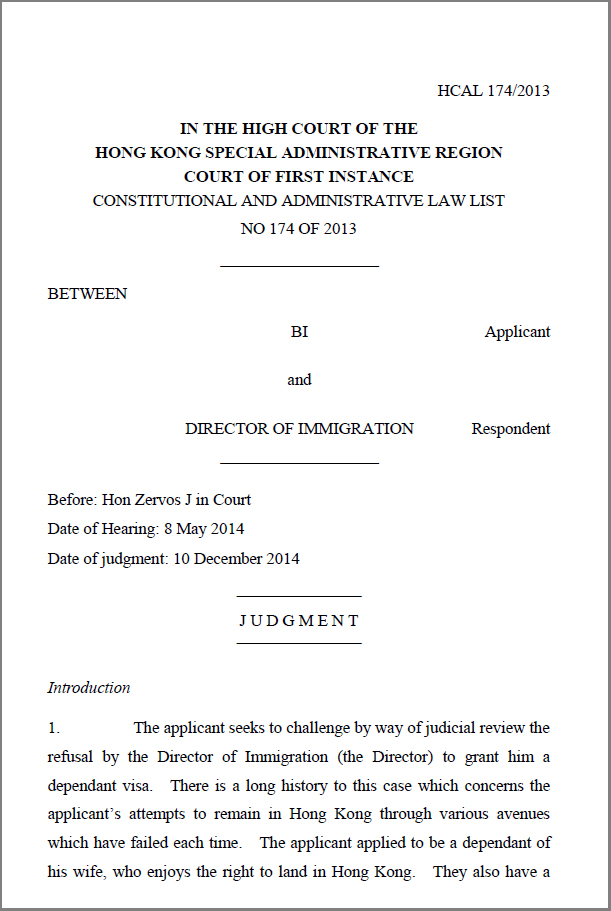
Are dependent visas reasonably denied?
Jan 27th, 2015 | Crime, Immigration, Legal, VF Opinion | Comment
After seeking asylum in Hong Kong, one of the first things refugees learn from peers is that they will never be allowed to integrate and earn a living (including successful non-refoulement claimants) unless they marry a resident and successfully obtain a dependent visa – which requires withdrawing protection claims before the sticker is affixed to a passport.
Immigration guidelines indicate that dependent visas generally take three months to process, although refugees experience a different treatment that, when successful, is likely to take two years and otherwise drags on for many years with litigation (which doesn’t come free) rising as the only option to break the stalemate, if official obduracy can be described as such.
A refugee blogger recently described immigration strategies as perceived by his community, “They know that certain people will find a way that is convenient for the government – though unfair for refugees – like marriage, moving to another country, smuggling out and closing asylum claims through so-called ‘voluntary departures’.”
The stigmatization of individuals who sought sanctuary in Asia’s World City is so profound that even years of love with local citizens cannot wash it away. Not even when beautiful children are living proof that marriages are real and a genuine family exists behind the paperwork that, in the mind of immigration officers, might have thrown a monkey wrench into removal proceedings.
A pattern emerges when scores of dependent visas are denied or delayed for applicants who were so unfortunate as to seek asylum before falling in love. It is unrealistic to expect that authorities publish statistics on failed application, which in our view should include applications stalled by ‘non decisions’ for over one year. The data would speak volumes about the bias treatment of refugee spouses.
It is regrettable that Immigration consistently fails applicants who committed mild offenses such as working, despite work being absolutely necessary for refugees to make ends meet since they do not receive adequate welfare assistance and belong to ethnic groups that are largely shunned by charities as being less deserving of their limited resources.
Working illegally is a matter of survival for most refugees, but a criminal conviction will jeopardize the fate of a family – including the future of resident children – even if a struggling refugee was arrested years before for selling bootlegged software or fake leather bags to keep a roof over his head or supplement meager food rations. Where is the fairness of laws that constrain pathways of survival only to mercilessly penalize those with no alternative but to stray?
A few examples illustrate the predicament faced by dozens of refugees:
Case one: a refugee since 2005, married in 2013 and was denied a dependent visa for reason of a life-time deportation order triggered by a 2007 offense “to export goods to which a forged trademark was applied” [NB: copy goods] at a time before he knew about refugee welfare assistance.
Case two: a refugee since 2005, married in 2011 and has a son. He was convicted of working, though he pleaded not guilty as he was visiting a friend at his place of employment. He was nonetheless convicted to four months and marked as ‘persona non grata’.
Case three: a long time refugee since 2002 married in 2008 and has a son. This family has been waiting for a dependent visa for 6 years. Arrested for false representation to an immigration officers after arriving in Hong Kong with a dodgy passport, he was served a deportation order that he gets suspended every year by the office of the Chief Executive. He has no chance of being granted a visa until said order is quashed.
Vision First takes the view that refugees must not be punished for struggling to survive in a hostile environment arguably designed to push them into criminality. On Sunday a refugee was arrested for being in possession of 5 mobile phone chargers (worth 300$) which he is accused of intending to trade, presumably to support his wife and child. Wouldn’t police resources be better allocated pursuing more substantial criminal activity?
It is further a travesty of justice that resident spouses and children are denied a legitimate future. There is a need for a moratorium on immigration rules the stringent application of which will never persuade fathers to abandon their loved ones.
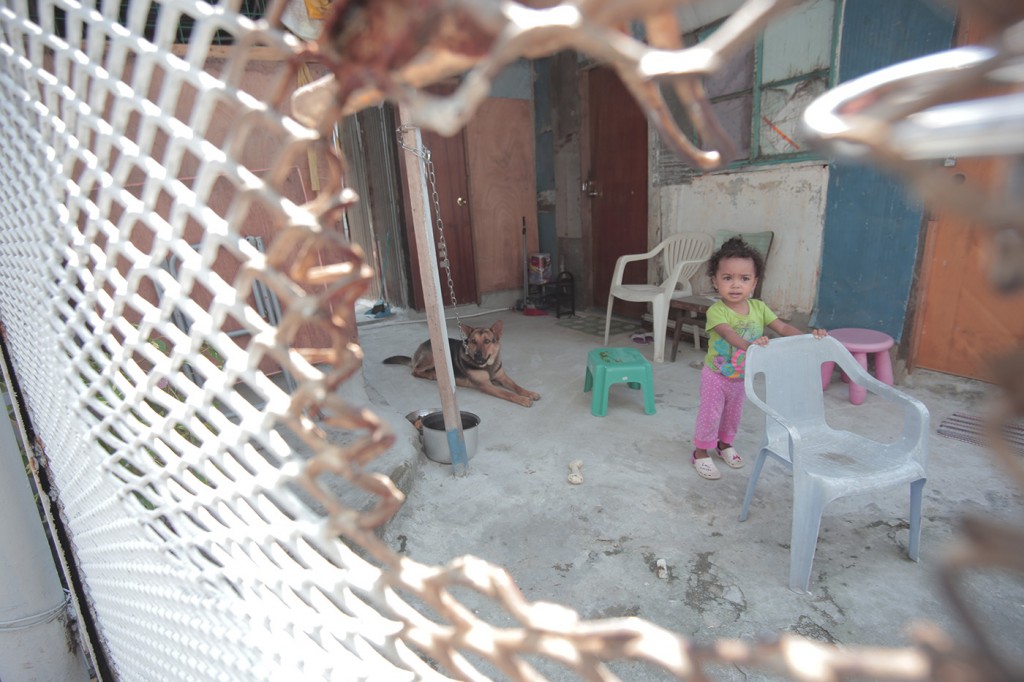
Refugees encouraged to take their troubles elsewhere
Jan 23rd, 2015 | Immigration, Personal Experiences, VF Opinion | Comment
A refugee blogger distressingly underscored the reality that crushes hope in his community. He wrote, “Hong Kong immigration delays hundreds of old cases because the answer would be positive”. Vision First has been informed by several refugees that Immigration officers had acknowledged, off-the-record, that their claims were strong, but no decision was ever made to accept or reject. Why?
Last week a refugee who sought asylum in August 2005 reported that he was summoned for yet another seemingly pointless interview. He lamented, “Three of us escaped to Hong Kong together. One went back, one left for Europe and I still do interviews. I forget how many times.… Are they waiting for me to forget or make a mistake on my case?”
His friend, who arrived in Hong Kong in 2003, had this to say, “They keep telling me I have a good case. They said it twelve years ago when I was 25 and now I am getting old. My lawyer said that they don’t know what to do with my case. It’s unbelievable.”
A few considerations should be made:
First, the legal framework governing asylum isn’t to blame. It could certainly be improved, but it is acceptable. The problem is implementation and, in particularly, ultra-long assessment times that raise the aphorism “justice delayed is justice denied”. Frequently no further evidence is provided, as in the case of a recognized torture claimant accepted after 10 years without adding anything to his first statement. The above blogger commented, “They know that certain people will find a way that is convenient for the government” and four recent cases may illustrate his point.
Case One: arrived in HK in 2007 and opted for ‘voluntary departure’ in 2014; sought asylum in Holland and was recognized as a refugee three months later; received 1500 Euro to meet living expenses until he found a job.
Case Two: arrived in HK in 2013 and opted for ‘voluntary departure’ in 2014; sought asylum in France and was recognized as a refugee in six weeks; was given a 5 years permit to stay with working rights and a monthly stipend until he found a job.
Case Three: a screened-in torture claimant of 2013, closed his protection case to ‘voluntarily depart’ in December 2014 for a European country where he lodged an asylum claim. His Hong Kong lawyer supported the decision because recognized refugees do not enjoy work rights and exceptions are hard to obtain and limited in scope.
Case Four: arrived in HK in 2013 and is utterly disillusioned about protection and future prospects. For the sake of wife and children, whom he is unable to assist back home, he plans to close his case and return to a neighbouring country. He will sell property and seek asylum in Europe.
Second, Europe is often mentioned as an idyllic place to seek asylum. However it is increasingly harder for people intending to seek asylum to reach the Old Continent amid securitization of border controls that make the journey ever riskier. In Hong Kong a similar process occurs. But rather than the journey being made difficult, it is the asylum procedure that is made relentlessly harsh, so punitive that claimants decide to give up.
Third, when refugees don’t give up despite Immigration bosses wanting nothing more than for them “to take their troubles elsewhere”, they are forced to repeatedly live a past that they would rather forget. A past of trauma and persecution that is revived every time they are called in for interviews.
Such an asylum mechanism affects justice in our city as we are reminded that the failure to treat anyone fairly, is ultimately a failure to treat everyone fairly.
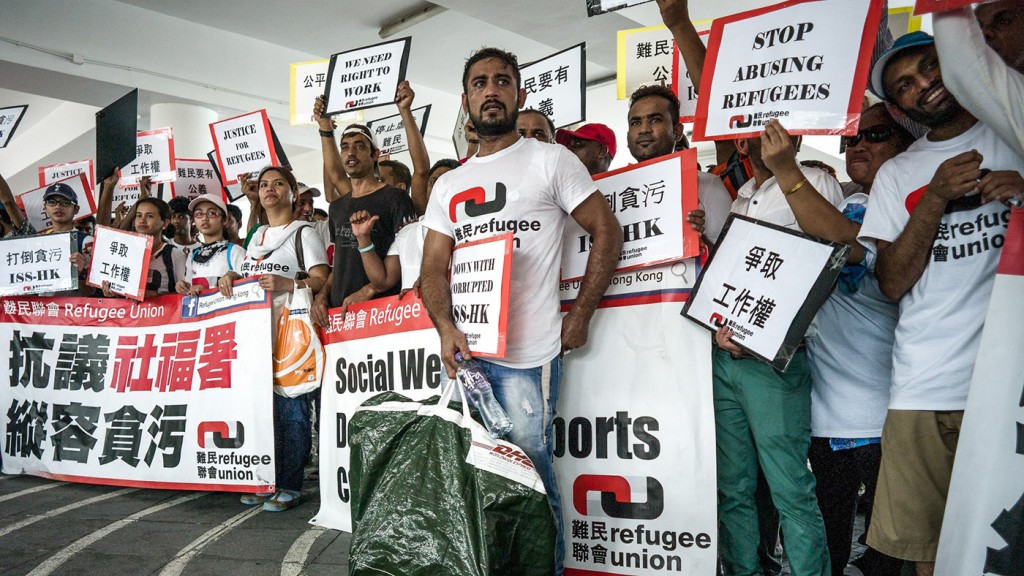
Parameters must change to tackle the housing crisis
Jan 20th, 2015 | Housing, VF Opinion, Welfare | Comment
Over the past few days Vision First inspected rooms available at several real estate agencies in Yuen Long, presumably a cheaper district than Kowloon. At one such agency a veteran estate agent lady asked “Why so many refugees come here?” That’s a legitimate question.
Suddenly evicted from slums where they lived for years, refugees are hopelessly touring agencies recommended by caseworkers to find alternative accommodation. Vision First accompanied them on visits to the cheapest units (locally called “tou fong” – suite-room), subdivided bedrooms with a minuscule toilet and a shelf for sink and kitchen top. For the purpose, older 500 s/f apartments are remodeled into four 100 s/f units accessed through a shared corridor. Such small units are generally clean and at 3500$ are acceptable bachelor flats for those who can afford them.
However, the arrangement becomes unpleasant when refugees on a 1500$ rent budget are compelled to cohabitate. Couples can cope with tight conditions, though a boyfriend observed, “I can share with my girlfriend, but she is not my wife. If we breakup who pays the rent? How one person can pay more than 3000$ by himself?”
Coping with stringent conditions, a group of five Pakistani share a 400 s/f apartment for 6000$ – two bunk in two tiny rooms, one sleeps in the lounge. But the agent complained, “Too many people! If one man has trouble [arrested by police or immigration] the others cannot pay. If one leaves [removed or deported], it is hard for them to find another [replacement], so always have trouble.”
Another agent went on a rant, “The cheapest room is 3200$ but landlord said no sharing. If too many people stay it is dirty. Many landlords have difficulty to get rent and utilities paid. Landlords are afraid. They don’t want to say why, they just refuse to consider.”
Further, destitute refugees are unable to make repairs and crowded cubicles are subjected to more than the ordinary wear and tear. A landlord complained of a broken sink, door and flooring, though it is hard to imagine high quality fittings are used in super-budget subdivisions. These are not concrete dormitories designed for heavy occupation, but inexpensively cubicles for single occupancy.
“Are you Pakistani? We don’t rent to Pakistani” snarled an agent to some Bangladeshi. Racism apart, when thousands of destitute young men squeeze into the crammed low-end housing market, attrition is unavoidable not only with landlords and agents, but also with local residents.
This leave us to ponder:
First, speaking with several estate agents, it became clear that landlord aversion towards refugees (never identified as such, but rather as ‘foreigners with ISS assistance’) was the principle obstacle. There was no issue renting to Vision First staff, but agents warned, “You cannot cheat. We can rent the room to you, but not to them. If the landlord discover they live there that is not honest for us.”
Second, stigmatization was widespread, agents would phone landlords to inquire about vacant rooms only to be blatantly told that “those black people are not accepted”. It was surprising to hear this repeated again and again. Also in the slums a resident grumbled, “Too many people in one room. It’s too noisy and I cannot sleep next to them. They shouldn’t be crammed together like that. It’s dirty.”
Third, agents showed our group tou fong ranging between 3200$ and 4500$. They were all in acceptable condition, some even nicely decorated. Rooms for 2000$ no longer exist in Yuen Long and even 3000$ rooms are hard to find and none were vacant. The limited supply of 3000-4000$ rooms is insufficient to accommodate the scores of refugees being evacuated from the slums.
Finally, the refugee housing problem cannot be solved without changing parameters. If refugees are to be banned from working, then they are destitute and deserve full support. It is illogical to impose a 1500$ rental ceiling that compels strangers to bunk in cramped spaces, eventually quarrelling and splitting up. This wastes government-funded deposits and exasperates landlords and agents, other than reinforcing the stereotype of refugees as dirty, noisy and foreign to Hong Kong society
It should be accepted that refugees must work to pay rent surplus, utilities and supplement inadequate ‘humanitarian assistance’. There is no point sticking heads in the sand! Raising the rent ceiling to 2000$ would just push the problem a few months forward, without resolution. Vision First reiterates that refugees ought to be allowed to work to make ends meet.
Letter to Security Bureau on slum crisis
Jan 19th, 2015 | Crime, Housing, VF Opinion, Welfare | Comment
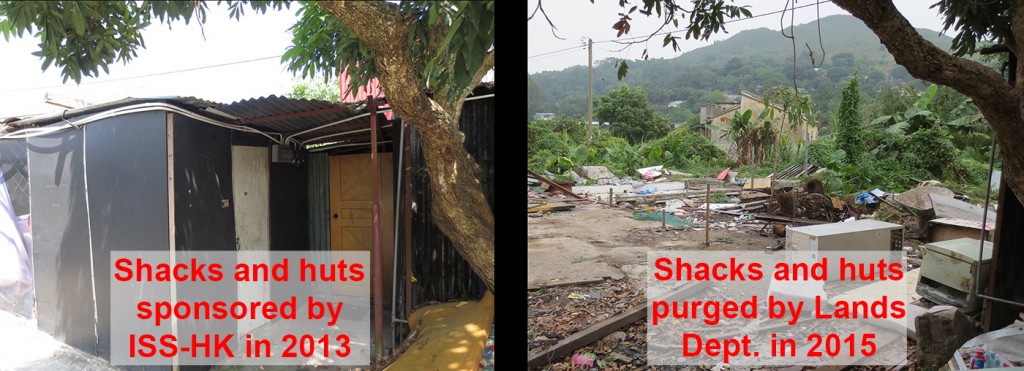
VF Opinion: It’s time for temporary work permits
Jan 16th, 2015 | Housing, VF Opinion, Welfare | Comment
Vision First was informed that on 15 January 2014 a delegation of refugees protested at the Social Welfare Department head-office against unrealistic rent assistance levels that pushed their backs against the ropes.
As many refugees are now forced to relocate from slums in which they lived for years, these same refugees face a compelling dilemma. With rental market prices on the rise and government rent assistance generally no more than $1500, where to find affordable rooms?
“ISS gave me a list of estate agents who showed me small rooms as big as a single mattress with prices between 3000$ and 4000$ a month. Also many wanted cash payment because they don’t want to work with ISS”, lamented an irate refugee who has lived in Hong Kong for 8 years.
Vision First expects that, since reliance on refugee slums has come under fire, the housing crisis will rapidly deteriorate as hundreds of claimants are forced into homelessness by failed welfare policies.
Besieged SWD officers listened carefully to the refugees, though clearly out of their depth as far as solutions were concerned. An SWD officer confirmed that, “in the past few months ISS was trying to resolve the slum problem”. A senior officer repeated a canned defense line, “We will raise your concerns with ISS and ask them to mobilize all their resources to find a solution.” But what resources are available to constrained caseworkers?
Fresh solutions are required to resolve a matter that brings great shame to Hong Kong. It is time for Hong Kong Government to pragmatically acknowledge the absurdity of so-called humanitarian assistance that fails to adequately house refugees in our expensive city. This utterly disappointing and unpleasant situation created by unrealistic rent levels ought to be urgently reviewed.
Vision First strongly recommends that refugees be allowed to work for the years it takes Immigration Department to determine asylum claims. It is sadly pathetic that every two years refugees must protest to raise welfare levels that fall hopelessly and predictably behind inflation. Further, temporary work permits would certainly benefit Hong Kong, as research demonstrates that refugees do not steal jobs from residents, but rather contribute extensively to raising their income.
Let’s be honest. If it is policy to hold thousands of refugees in limbo while claims flounder in bureaucracy, then it is only fair that claimants be allowed to earn a living to supplement unacceptably low assistance levels. This wouldn’t be inconsistent with the token welfare safety-net that forces destitute, old and needy citizens to eke out a subsistence living on their knees.
The Refugee Union presented this protest letter to SWD and Security Bureau
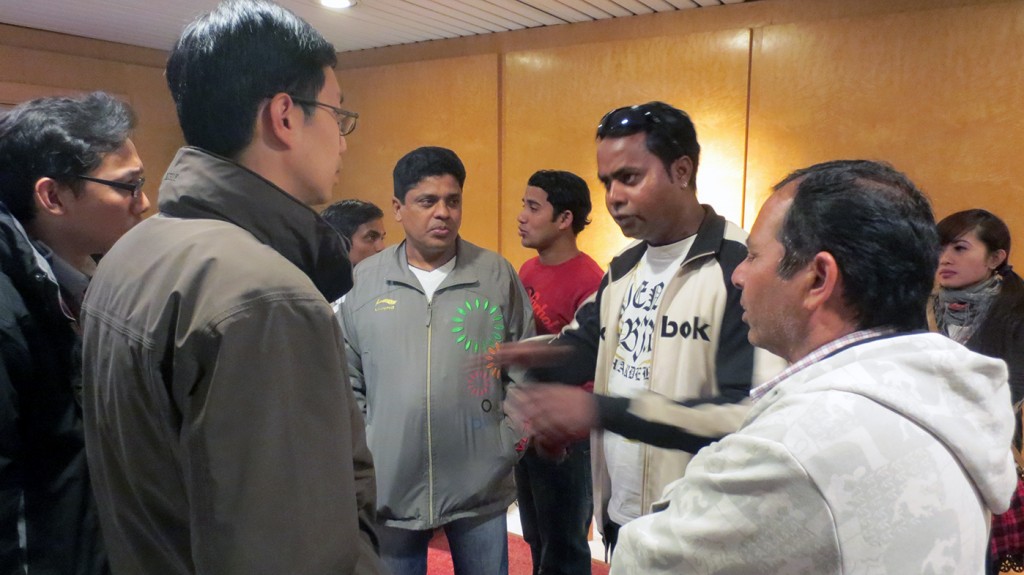
Nothing is more fatal to justice than apathy
Jan 10th, 2015 | Crime, VF Opinion, Welfare | Comment
We call him “Russia”, although his real name is Leo, because he hails from Leo Tolstoy’s country. His experiences and his namesake speak convincingly of an aphorism applicable worldwide and here in Hong Kong: “All that is necessary for evil to triumph is for good men to do nothing”.
Leo sleeps on a sofa at the Refugee Union to avoid being homeless, not owing to this winter cold that barely tickles Russians, but owing to the disgrace of his unavoidable predicament. In fact, upon registration he politely asked if he could sleep on the rooftop to avoid being out on the street.
Urban refugees who either don’t have a home, or don’t have money to pay rent surplus, lament the humiliation of being let down by the authorities that treat them indifferently, to say the least, as if condemning human beings to physical suffering and psychological despair were a customary prerogative of power.
There was a time, and not so long ago, when refugees received no help at all. The dark ages ended in 2006 with the introduction of meagre assistance, but today is hardly a progressive time as welfare seems formulate to include deprivation and punishment. Vision First contends that perhaps ‘no aid’ is preferable to ‘some aid’ because those with much to hope, have nothing to lose in activism.
Let’s consider two aspects, housing and food, before drawing conclusions. First, unrealistic rent assistance force hundreds of refugees into the grip of slum lords, who think nothing of verbal abuse and, in extreme cases, criminally intimidation. Last week, in another extreme case, landlord thugs launched dogs against refugees and threw burning paper into rooms in arson attacks.
Second, failed food distribution generates a host of alarming practices: the widespread and mysterious phenomenom of deminishing rations; substandard and undesirable products that encourage the ‘revolving door scam’; profiteering through questionable merchandising practices, and inferior or rotten produce; and, in one extreme cases, distribution of contraband milk.
Vision First is reluctantly becoming the reporter and repository of ‘extreme cases’ that seem to shed their extremeness as they increasingly become more prevalent and less surprising. Refugee victims regularly file police reports, but lament that perpetrators avoid prosecution as demonstrated by the persistence of their actions. Are certain social groups fair game for abuse?
Apathy in law enforcement is indicative of a selective application of law and order, as resident victims might arguably experience a swifter and less biased application of criminal law. Beyond apathy, it is the way laws and regulations to upheld justice at times work against the justice they should upheld, to the point that the police might be less inclined to pursue local goons when they can take an easy shot at people perceived as enjoying lesser human rights.
Thus, are refugees perceived as second-class victims already submerged in criminality? Is their victimization tolerated within the culture of rejection? Why does guilt seem to circle back to them? Do we all share the blame in turning a blind eye to such developments?
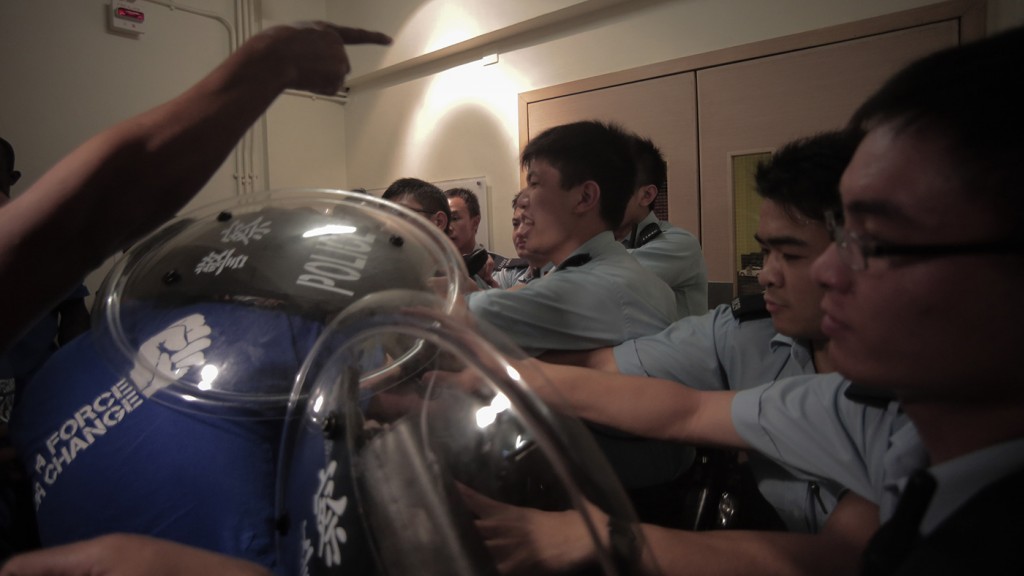
Lone Ranger battles asylum failures in court
Jan 3rd, 2015 | Legal, VF Opinion, Welfare | Comment
The emergence of the refugee activist is contagious! Over 2013 and 2014, Mr. Akhter Rana Shahid filed complaints against several government departments and the ISS-HK for these bodies were argued to have failed to protect him. The complaints were dismissed.
We do like to take this opportunity to contribute our views as the matters raised by the plaintiff are, we believe, of public concern. Although we haven’t had the pleasure of meeting Mr. Akhter Rana Shahid, we think the grievances dismissed by the Court of First Instance in HCMP 3094/2013 may not be as frivolous and vexatious as they certainly appear at first sight to unconcerned readers.
The following considerations should be made.
First, while the plaintiff filed separate complaints against the Immigration Department, Police, Social Welfare Department, Legal Aid and the ISS-HK, there seems to be a common thread that unites them: the lack of a comprehensive asylum procedure that causes refugees intolerable hardship. Some failures were listed by the seven originating summons, interestingly against some of the agencies at the forefront of the government attempt to contain, or simply manage, the asylum ‘problem’. In this vein, we are left with the uncomfortable feeling that the confused and scattered issuance of summons, as well as the unclear arguments put forward by the plaintiff, alleging circumstances that seem to miss the point though sound plausible, may be explained by the lack of legal representation. A paucity of Legal Aid approvals and the rarity of pro-bono support are issues that undeniably thwart refugees who resort to legal proceedings in person, hoping to find a sympathetic ear and justice. It is significant that on the one occasion that Mr. Shahid had legal representation he was awarded compensation for unlawful detention.
Second, in the burglary case, it is unclear how the investigation unfolded, but two issues seem clear. The plaintiff alleges he found a burglar in his home, and the burglar was surprisingly his landlord. Whether this person was in cahoots with ISS-HK is debatable. What seems plausible is the fact that, for political reasons, refugees are placed in a state of vulnerability that is implemented by ISS-HK, thereby drawing upon this agency the ire of refugees, with a predictable eruption of problems and confrontations. Further, the ISS-HK services, or lack of, can be said to cause innumerable disputes between refugees and bottom-tier landlords. It is accepted that refugees are compelled to settle in certain rooms, and at certain restrictive conditions, due to insufficient rent assistant. It is not new to us that some landlords take justice into their own hands and, if rent is not on time and in full, think nothing of threaten tenants, cutting electricity and water, locking them out of their homes and even stealing from them, safe in the knowledge that refugees (women in particular) often hold back from reporting such criminal behaviour to the police. When reports are made, police intervention generally dismiss such incidents as ‘personal matters’.
Third, the background situation raises grave concerns about the well-known problem of the welfare assistance to refugees being wholly inadequate. The glaring shortcoming is predicated on the misguided rationale that such benefits are indeed not welfare, but humanitarian assistance provided in-kind and only in a measure sufficient to prevent destitution, while discourage hopeful asylum seekers from coming to Hong Kong. The logic of this political decision is challenged by the evidence of widespread suffering across the refugee community, hardly justifiable by deterrent objectives. Despite a shameful reality plain for anyone to observe, inhumane policies and practices persist. Further, the ISS-HK and SWD assistance package is rarely vigorously challenged in court where the judiciary commonly takes the view of its sufficiency, as in the numerous cases of refugees convicted for taking up employment merely to pay rent and buy food. One can only query why and to whose advantage?
Fourth, while it is the duty of the Legal Aid Department to assess the merits of each application and prevent the waste of public funds in frivolous and vexatious claims, it is doubtful that Mr. Shahid was in a position to present full particulars and evidence in a professional manner without the assistance of a lawyer. We are not told the details, but a few questions come to mind: Did the police readily furnish records of the burglary investigation? And did ISS-HK provide details of partial rent payments that precipitated the plaintiff’s relationship with his landlord? Logic presumes that, if refugees are to be banned from working, then Hong Kong government should arrange accommodation and, if necessary, pay rent in full. Did the plaintiff make this critical connection clear to Legal Aid? Can refugees acting in person in court be reasonably expected to grasp legal requirements and procedures? That is, should they know how to present cases by themselves against well represented defendants? Can anyone in such a fraught state of mind (i.e. feeling persecuted at home and in HK) produce a compelling case to take on the Justice Department alone?
Ultimately, we believe that something important should be learned from Mr. Shahid’s troubles. His legal actions, though defeated, make public the desperation of a refugee who attempted in several ways to find a place in society and relied consistently on the authorities to be treated fairly. Each time he was frustrated by the lack of justice, actual or perceived, that he believed he deserved. It seems obvious that there is a mismatch between his reasonable expectations of living in a fair and just society, developed by any standards, and the reality of finding himself in a place that intentionally dehumanized him. Government deterrent policies against asylum seekers might be effective in disillusioning present asylum seekers, but why do asylum seekers keep coming and arrive with little or no knowledge of actual conditions? In such light, are the prevailing deterrent measures failing? Or is the deterrent rationale simply a measure to punish those already seeking asylum in Hong Kong, rather than discouraging others from making the journey?
Rooting advocacy in dignity and respect
Jan 1st, 2015 | Advocacy, Rejection, VF Opinion, VF updates, programs, events | Comment
Dear VF members and supporters –
A refugee blogger reminded us that people should be judged by the breadth of their mind and the depth of their character, not by their social position or economic achievement, and certainly not by their immigration status imposed by states.
One would think that this fundamental notion should be generally accepted as obvious in our day and age, but does it consistently discharge ingrained preconceptions, cultural bias and ethnic stereotypes?
There is a wide range of views about what constitutes respect, a mindset that perhaps has less to do with how people are esteemed, and more to do with how others are treated. The Golden Rule might be taken as an acceptable universal standard, for it is found remarkably at the root of many cultures.
The Golden Rule states that, “One should treat others as one would like others to treat oneself.”
This ethic of reciprocity prescribes a mutual, two-way relationship between oneself and others that involves genuine equality in treatment, particularly as a fair formula to resolve conflicts. Advocates will recognize that this concept underpins most international treaties and many domestic laws relating to the treatment of those perceived with otherness, different or foreign, refugees or not.
In 2014 Vision First continued to undergo a significant evolution in order to replace a comfortable program-centered approach with a challenging watchdog core. This transformation didn’t come easy, but was necessary to adapt our agency to an emerging reality in the asylum sphere, which Vision First were instrumental in generating, namely, the emergence of the refugee activist.
Critics might lament that we are too radical, that we are incapable of collaborating and prefer to provoke conflict, than foster dialogue. We contend that the strong opinions informing our actions are supported by even stronger data extracted from the reality we observe daily.
Therefore we believe that the keystone is the Golden Rule in its cautionary form: “One should not treat others in ways that one would not like to be treated.” As unlikely as it is that we will ever experience the hardship of asylum, truth is that governments are increasingly irresponsive to citizen wishes and needs, other than the most powerful. What if one day we were humbled into calling for help and those we pleaded with turn the other way?
What would we think if forced to seek asylum in a country where protection was an empty, illusory promise? Would we then be outraged at a zero-percent acceptance rate? How would we appraise insufficient welfare without the right to work? Would we submit to living in rat-infested slums as directed by government contractors? Would we keep quiet if our food rations were pilfered? What would we tell our children if we couldn’t buy school books?
How would we then esteem a society that fails indifferently to act upon our grievances?
These might be questions far too remote and abstract for wealthy readers who enjoy, or so they believe, freedom of speech and social security. Such answers might reverberate in the warmer corners of our heart, where the spirit of humanity overshines misguided conformism and complacency.
We might find consolation in charity by giving to malnourished children in evidently distant geographies, but turn a blind eye to families suffering in our community. Would we sleep comfortably at night knowing that our donations might indeed cause more harm than good in the long run?
Vision First champions advocating fearlessly against injustice by consistently speaking bluntly to counter unfair policies and reprehensible activities, even when threatened with defamation. We are less concerned about what will happen to us personally, than the discrimination suffered by our members.
Perhaps the effectiveness of an advocate is best measured by what she is prepared to sacrifice, outside her obvious comfort zone, because personal misery has a distinctive way of clarifying one’s convictions.
Hong Kong is a hard and forbidding metropolis for those unfortunate enough to hold undesirable citizenship, or have experienced grim circumstances. It has been said that the measure of civilization and its moral progress should not be judged by the treatment of its highest people, but of its lowest. In this respect, each citizen decides whether to defer to power and privilege, or defend the vulnerable.
Vision First firmly contends that it is scandalous to hold anyone in poverty, want and insecurity. Our present mandate is to safeguard refugee rights and, as such, we shall redouble our efforts to counter unjust policies and intolerable practices apparently formulated to control rather than assist refugees.
Vision First thrives in conflict, open debate and change and we look forward to generating more in 2015.
Happy New Year!
New Year Message in PDF format
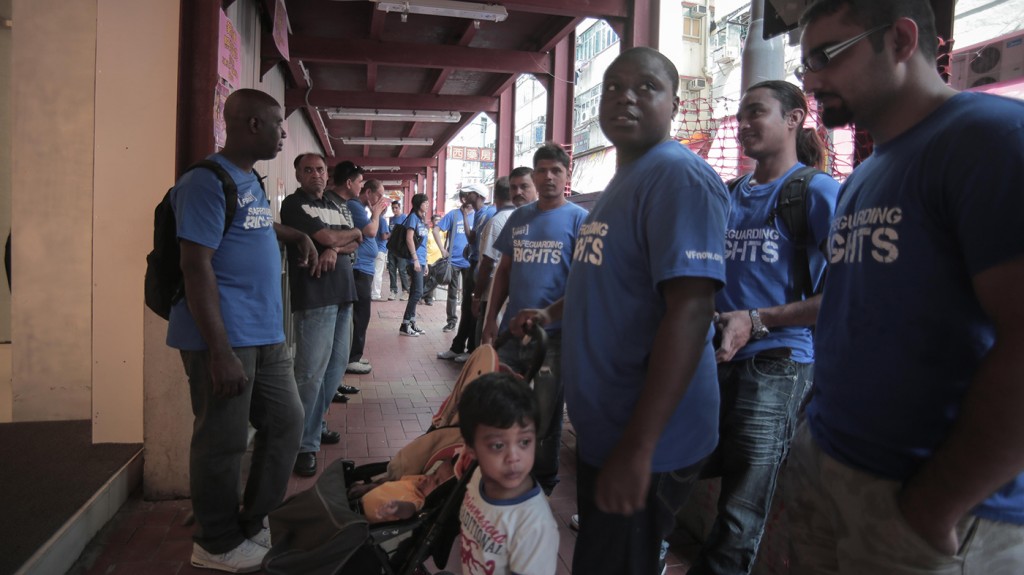
Who safeguards the inherent rights of refugee children?
Dec 29th, 2014 | Advocacy, VF Opinion | Comment
The op-ed by Grenville Cross SC recently published in the SCMP, “Hong Kong’s children need better protection of their rights” is worthy of our attention and comment. Vision First applauds the advocate for attempting to shed light on what constitute the best interest of children and how the government is on the right path to deliver better policies and reforms, albeit slowly.
However, Grenville Cross SC may not be aware of the appalling infringement of the rights of refugee children. Vision First therefore invite him to visit refugee families that are conspicuously sidestepped by the same administration he states is working towards eradicating poverty and enhancing the livelihood of the poor. He would then witness first-hand how children with refugee parentage are forced to endure the shameful conditions the government claims to be tackling.
The pattern is as disgraceful as it is widespread and Vision First repeats it emphatically: refugee parents are compelled to work illegally to pay living and education costs inexplicably only covered by the government in part; mothers worry their children will go hungry when meager food rations are consumed before the next three monthly collection; children dejectedly skip school when travelling allowances are exhausted; students are discriminate against because they cannot afford to buy school books, lunch-boxes, uniforms, or join extra-curriculum activities, or bring cake to birthday parties.
Nobody is under any illusion about the challenges and cost of raising children in our expensive city. Basic but necessary expenses disregarded by the government can only be met by refugee parents if they either humble themselves by begging, or stoically risk incarceration by engage in illegal work, both activities presenting predictable and unenviable drawbacks.
While charity is neither sufficient nor dependable in the long term (NGO workers cherry-pick the fortunate), work is outlawed as a serious crime punishable by a mandatory custodial sentence (maximum 36 month jail and 50,000$ fine). Since parents are stigmatized as unwelcome vagrants denied legal and economic rights, refugee children are often condemned to live without one at home if a parent is jailed for earning money for food, clothes, transport or school.
All this happening in dreadful, unsanitary living conditions, frequently in slums, and under unending psychological distress. In fact, refugee children are condemned to suffer 40 percent below the poverty line, without any prospects of improving prospects as parents are legally prevented from earning a living. And this without taking into account the statelessness they are generally condemned to when parents are fearful of their consulate authorities.
Vision First raises alarming questions about the vulnerability of refugee children:
- Why are refugee children ignored despite falling well below what is provided to the poorest resident children?
- Why do authorities fail to address the huge criticism in UN reports, including this one by the Committee on the Rights of the Child?
- Will the Child Protection Institute promote the rights and wellbeing of refugee children, who are the veritable invisible and untouchable in our society?
- When will HK government safeguard the inherent rights of these children?
